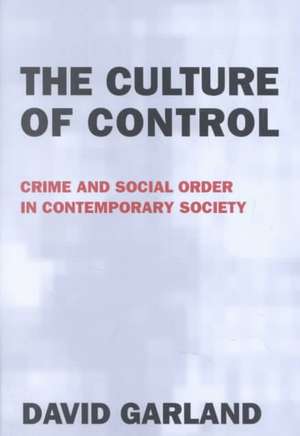The Culture of Control: Crime and Social Order in Contemporary Society
Autor David Garlanden Limba Engleză Paperback – aug 2002
The past 30 years have seen vast changes in our attitudes toward crime. More and more of us live in gated communities; prison populations have skyrocketed; and issues such as racial profiling, community policing, and "zero-tolerance" policies dominate the headlines. How is it that our response to crime and our sense of criminal justice has come to be so dramatically reconfigured? David Garland charts the changes in crime and criminal justice in America and Britain over the past twenty-five years, showing how they have been shaped by two underlying social forces: the distinctive social organization of late modernity and the neoconservative politics that came to dominate the United States and the United Kingdom in the 1980s.
Garland explains how the new policies of crime and punishment, welfare and security—and the changing class, race, and gender relations that underpin them—are linked to the fundamental problems of governing contemporary societies, as states, corporations, and private citizens grapple with a volatile economy and a culture that combines expanded personal freedom with relaxed social controls. It is the risky, unfixed character of modern life that underlies our accelerating concern with control and crime control in particular. It is not just crime that has changed; society has changed as well, and this transformation has reshaped criminological thought, public policy, and the cultural meaning of crime and criminals. David Garland's The Culture of Control offers a brilliant guide to this process and its still-reverberating consequences.
Garland explains how the new policies of crime and punishment, welfare and security—and the changing class, race, and gender relations that underpin them—are linked to the fundamental problems of governing contemporary societies, as states, corporations, and private citizens grapple with a volatile economy and a culture that combines expanded personal freedom with relaxed social controls. It is the risky, unfixed character of modern life that underlies our accelerating concern with control and crime control in particular. It is not just crime that has changed; society has changed as well, and this transformation has reshaped criminological thought, public policy, and the cultural meaning of crime and criminals. David Garland's The Culture of Control offers a brilliant guide to this process and its still-reverberating consequences.
| Toate formatele și edițiile | Preț | Express |
|---|---|---|
| Paperback (2) | 249.99 lei 6-8 săpt. | |
| University of Chicago Press – aug 2002 | 249.99 lei 6-8 săpt. | |
| Oxford University Press – 26 sep 2002 | 291.49 lei 31-37 zile | +49.99 lei 4-10 zile |
| Hardback (1) | 446.07 lei 6-8 săpt. | |
| OUP OXFORD – 28 mar 2001 | 446.07 lei 6-8 săpt. |
Preț: 249.99 lei
Nou
Puncte Express: 375
Preț estimativ în valută:
47.85€ • 51.99$ • 40.22£
47.85€ • 51.99$ • 40.22£
Carte tipărită la comandă
Livrare economică 21 aprilie-05 mai
Preluare comenzi: 021 569.72.76
Specificații
ISBN-13: 9780226283845
ISBN-10: 0226283844
Pagini: 336
Dimensiuni: 152 x 229 x 20 mm
Greutate: 0.44 kg
Ediția:1
Editura: University of Chicago Press
Colecția University of Chicago Press
ISBN-10: 0226283844
Pagini: 336
Dimensiuni: 152 x 229 x 20 mm
Greutate: 0.44 kg
Ediția:1
Editura: University of Chicago Press
Colecția University of Chicago Press
Notă biografică
David Garland is the Arthur T. Vanderbilt Professor of Law and Professor of Sociology at New York University. He is the author of the award-winning studies Punishment and Welfare and Punishment and Modern Society.
Cuprins
1. A History of the Present
2. Modern Criminal Justice and the Penal-Welfare State
3. The Crisis of Penal Modernism
4. Social Change and Social Order in Late Modernity
5. Policy Predicament: Adaptation, Denial, and Acting Out
6. Crime Complex: The Culture of High Crime Societies
7. The New Culture of Crime Control
8. Crime Control and Social Order
Appendix
Endnotes
Bibliography
Index
2. Modern Criminal Justice and the Penal-Welfare State
3. The Crisis of Penal Modernism
4. Social Change and Social Order in Late Modernity
5. Policy Predicament: Adaptation, Denial, and Acting Out
6. Crime Complex: The Culture of High Crime Societies
7. The New Culture of Crime Control
8. Crime Control and Social Order
Appendix
Endnotes
Bibliography
Index
Descriere
Descriere de la o altă ediție sau format:
The Culture of Control charts the dramatic changes in crime control and criminal justice that have occurred in Britain and America over the last 25 years. It then explains these transformations by showing how the social organization of late modern society has prompted a series of political and cultural adaptations that alter how governments and citizens think and act in relation to crime. The book presents an original and in-depth analysis of contemporary crime control, revealing its underlying logics and rationalities, and identifying the social relations and cultural sensibilities that have produced this new culture of control. In developing a "history of the present" in the field of crime control, David Garland presents an intertwined history of the welfare state and the criminal justice state, a theory of social and penal change, and an account of how social order is constructed in late modern societies. Drawing on extensive research in the UK and the USA, he shows in detail how the social, economic and cultural forces of the late 20th century have reshaped criminological thought, public policy, and the cultural meaning of crime and criminals.The Culture of Control explains how our responses to crime and our sense of criminal justice came to be so dramatically reconfigured at the end of the 20th century. The shifting policies of crime and punishment, welfare and security - and the changing class, race and gender relations that underpin them - are viewed as aspects of the problem of governing late modern society and creating social order in a rapidly changing social world. Its theoretical scope, empirical range and interpretative insight make this book an indispensable guide to one of the central issues of our time.
The Culture of Control charts the dramatic changes in crime control and criminal justice that have occurred in Britain and America over the last 25 years. It then explains these transformations by showing how the social organization of late modern society has prompted a series of political and cultural adaptations that alter how governments and citizens think and act in relation to crime. The book presents an original and in-depth analysis of contemporary crime control, revealing its underlying logics and rationalities, and identifying the social relations and cultural sensibilities that have produced this new culture of control. In developing a "history of the present" in the field of crime control, David Garland presents an intertwined history of the welfare state and the criminal justice state, a theory of social and penal change, and an account of how social order is constructed in late modern societies. Drawing on extensive research in the UK and the USA, he shows in detail how the social, economic and cultural forces of the late 20th century have reshaped criminological thought, public policy, and the cultural meaning of crime and criminals.The Culture of Control explains how our responses to crime and our sense of criminal justice came to be so dramatically reconfigured at the end of the 20th century. The shifting policies of crime and punishment, welfare and security - and the changing class, race and gender relations that underpin them - are viewed as aspects of the problem of governing late modern society and creating social order in a rapidly changing social world. Its theoretical scope, empirical range and interpretative insight make this book an indispensable guide to one of the central issues of our time.
Recenzii
There is a tremendous readability and clarity about The Culture of Control that almost disguises the mass of learning and information in the book. In fact, it is difficult to know which feature is to be admired more: the extraordinary sophistication, the integration of so many different approaches and disciplines, the snappy writing, or the lucid ordering of the argument. There is compelling realism about Garland's work. Much of it rings true, although some may find the reading of recent social history rather left wing. Against the backdrop of the new, dispiriting, CJS White Paper, here is a prophet for our times.
Garland's book is more than just an important contribution to criminology. It is also a major work of social analysis, which deserves to be read more widely ... his account of changes in crime control also provides one of the clearest and most convincing characterizations of contemporary society in general.
Garland's book is more than just an important contribution to criminology. It is also a major work of social analysis, which deserves to be read more widely ... his account of changes in crime control also provides one of the clearest and most convincing characterizations of contemporary society in general.



















